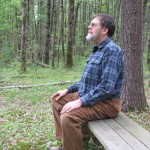I’ve been contacted this week by a reporter on religion, who wants to talk about my Quaker Paganism. I feel clear about going ahead and speaking to this man–I’m not going to represent “all Friends everywhere”, and I’m certainly not going to represent all Pagans. In fact, I may not be representing anyone at all, including myself; I can’t be sure that, after the most recent exchange of emails, this fellow will still think me worth an interview. Turns out that the original spark for the article may have been a mis-impression that I consider myself both Christian and Pagan. And, though I know and respect a number of Christian Pagans, or Christian-leaning Pagans, I’m not one of them.
Unless, of course, I am. Can we define our terms, please? (Warning: Christ-centered language and vocabulary follows.)
Brent Bill–a Christian Quaker if ever there was one–wrote about the experience of worship in his book, Holy Silence:
…worries about work waiting for me at the office, and the flood of minutiae that swamps my mind when outside noise stops slowly vanished–dropping into a well of holy silence. I let myself be guided into the deep waters of the soul.
That is when it happened. The only thing I can compare it to is the Catholic belief that in the “celebration of Mass…Christ is really present through Holy Communion to the assembly gathered in His name.” It is the same way with silence for Quakers… …That October day, on the side of the Green Mountains, Jesus was good to His word that, “where two or three come together in my name, there am I with them.” In the silence, where outer and inner noise ceased, we became what Quakers call a gathered meeting–gathered together and with Jesus. We sensed Him in the electrified air. I felt charged with an awareness of the miraculous–the marrow of my bones hummed in holy recognition of the One who had stood at the dawn of creation and called the world into being. And it did not just happen to me.
…As if something had been lit deep inside and now shone from their faces, we saw “grace and truth” reflected in the people around us.
Now, unlike Brent Bill, I have things I can compare this experience to other than the celebration of the Mass. I can compare it, for instance, to direct encounters in Pagan worship with the Goddess.
Also unlike Brent Bill, I am not inclined to search for Biblical names and stories for language in which to cloathe my experiences.
But I know the experience of which he speaks here. Can I prove it, to a Friend inclined to disqualify me from Quaker life because the story of the historical Jesus does not “speak to my condition”? No, I cannot, any more than I can prove to an atheist that there is anything more to religious experience than self-delusion. But I don’t think that’s an interesting problem on which to dwell. These words do “speak to my condition”–and, in Quaker worship, I have found the most consistent and deeply moving and transformative spiritual experiences of my life.
Thus far, no direct encounter with the Light of Quaker worship, or with the gods of Paganism, has implied any contradiction in my Pagan thealogy and my Quaker practice. This seems entirely reasonable to me–the Light was around a long time before they invented paper, on which to record Bible stories… or language, in which to discuss spiritual experiences… or humans, to have our own peculiar variety of them. The universe is old, baby; old and mysterious and full of Light and passion, and I see the Light and the passion as One thing, and all our gods and all our stories and all our words as only echoes of it.
Some of the echoes are more useful than others. Christianity, at least as Friends understand it, clearly is useful.
I know this because Christ-centered friends manage not only to encounter the Light on a regular basis, but to become transformed by It and filled with It and to go out into the world and let their lives speak.
As do some Pagans (and members of many other religions, I am sure, though I’m not speaking of that now). And more will, over time, if Pagans can develop some of the kinds of spiritually grounding practices Friends have found over the last three centuries.
But I’m not a Pagan or a Quaker because their stories hold truths that are useful in general.
I’m a Pagan because, when I stand before an oak tree with leaves gone russet, or when I glimpse the stag when the deer are in rut, my belly grows tight with the joy and lust of the earth. And I have looked into my beloved’s eyes, and seen a god looking out again, and smelled him on my skin.
I’m a Quaker because, when I center down into the silence, a Light comes and bears me away in a flood tide of joy and certainty that I can just tell runs inside the cell of the smallest animal, and fuels the fire in the most distant star.
Is that Light “Jesus”? Seems like a small name to me. I can’t see it, guys. Not disputing that some of you can, and do. And that many of you find yourselves better able to follow that Light when that’s the name you use. OK. Good-oh…
I love that Light. I rejoice in it. I am trying to listen to it, to be faithful to it, and perhaps to grow into it.
Is that Christian?
Truth to tell, I don’t want it to be. Christians have so much to apologize for. Hey, Pagans have more than our share of embarrassing nitwits, to be sure–but none of them are running for president. None of them are close to the kind of political power it takes to mess things up on a national or even global scale. Which is kind of a relief. Honestly, I don’t know how you Christians who own that name can stand the humiliation of what is done by so many who share that label. And I’m not saying that as a put-down. Rather, when I think of those who are honestly trying to live up to the messages of peace and love I hear in my Friends’ meeting (if not in my Bible, when I pick it up and read it) I’m a bit awed that you’re willing to accept the name. Simply calling yourself a Christian, in a world where that word has become so useful to the self-righteous and the hateful, takes a lot of integrity–it is a small way of taking up the cross, I guess, for a Peggy Senger Parsons, or a Marshall Massey, to refuse to concede the name to folks who use it to champion bigotry and hate.
All the same, I don’t want to take that name for my own. Yeah, I do think that you can be both Pagan and Christian–from a polytheistic Pagan perspective, there’s no difficulty at all in adding one more to the pantheon. I know plenty of Christians disagree with that, but, well… not a Christian, so, see, not really a worry on this end.
But a lot of Pagans disagree, too. Even my Quaker Paganism is “welding a little too close to the gas tank”, as my friend Gwyneth once said of something a little too explosive to deliberately embrace. And part of my love of Paganism is its rootedness–the bonds of community. Oh, my friends would still love me, and I’d still be tied to the communities of love and trust we’ve created together–just as we embrace the atheist or non-Pagan parents, children, and spouses we’ve accumulated over the decades. But it would feel very sad–a co-optation, for me to step out of our Sacred Circle. So for that reason alone, I would wish never to be called to do so.
I have a Quaker friend who believes that Friends need to begin to incorporate elements of Paganism into our practice–because mere “stewardship” is not immediate enough or strong enough to express the passionate love for the planet he believes we must have, if we are to avoid our own extinction, among other evils. Well. He’d say it better–it’s his ministry, not mine. But there is something in the Pagan message that, at least for some of us, is as needful as the scriptural messages more traditional Friends embrace.
That’s not really what drives me to write these words, today, though. No–I think it’s because, unlike most Americans, whether Quaker or Pagan, I have never been Christian. What that means, I think those who have been lifelong Jews or atheists could explain: I have never been what my culture deems “acceptable” spiritually. My culture has been at war with my deepest spiritual yearnings for my entire life. And the tension is terrible–and not voluntary. I never chose to be non-Christian. And, though I have chosen to follow my Pagan leadings, the leadings always came first. It would have been an act of violence for me to disregard them.
Among Friends–among liberal Friends–I have the first faint glimmerings of what it might be like not to be living in a state of spiritual siege. What it might be like to be fine, part of not only a community, but my culture, without severing myself from half of who I am. And it grieves me when I hear, as I do, of Quakers in liberal meetings who are afraid to voice their Christianity, for fear of the same kind of cultural rejection I know so well.
I would have us all speak the words the Light gives us, and, as in the Woolman story, “listen where the words come from“; I would have us set aside what we cannot yet hear, but to do so gently and tenderly, knowing that we are none of us ready to hear all the truth at once… but as we live up to the Light we are shown, more will be given us.
I would have the war be over. I would take your hand, friend, whether you are Quaker or Pagan or something else entirely, and sit with you in the Light, and listen lovingly to you and with you.
I would have peace.















